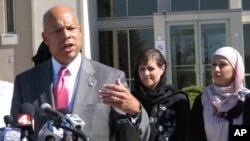U.S. law enforcement teams sometimes walk a fine line in trying to enlist the help of the same communities that they're also monitoring. Authorities say they need everyone's help in battling violent extremist ideologies and actions, and to that end, they are urging the public: Trust us.
"You have to have the basic trust in law enforcement," said Chuck Jenkins, sheriff of Frederick County, Maryland. "We are the ones out there, really, to protect and serve the public, and the only way we can do that is with their help."
Countering extremism through cooperation at a time of rocky relations between authorities and the public, however, could be a hard sell. Police overreach has come under intense scrutiny in the past year after the police killings of several unarmed African-Americans.
Muslim Americans say they, too, are unfairly singled out, and not just by police, but by federal agencies taking part in Countering Violent Extremism (CVE) efforts.
The U.S. Department of Homeland Security says those efforts begin with "the premise that well-informed and well-equipped families, communities and local institutions represent the best defense against violent extremist ideologies." It acknowledges that it pays special attention to communities that may be targeted for recruitment by violent extremists.
“I think the problem with our CVE work right now with law enforcement is they seem to be focused on Muslims, when actually, from their own data, the problem is much wider,” said Imam Johari Abdul-Malik of the Dar al Hijrah Islamic Center in Falls Church, Virginia, where he runs programs aimed at curbing extremism.
Abdul-Malik referred to recent data by the Washington-based research center New America that indicated nearly twice as many people have been killed by non-Muslim extremists — which include white supremicists and anti-government militants — as Muslim ones in the years since the 2001 al-Qaida attacks in the U.S.
Law enforcement officers say they understand extremism takes all guises. They point to the man charged in the killing of nine black parishioners in a Charleston, South Carolina, church last month, who had posted his white supremacist views online prior to the attack.
But authorities say CVE projects are aimed at militancy of all stripes.
“We encourage every parent ... to monitor their children’s social media sites, their cellphone usage, their text messaging — all those [communications] that could indicate that they're getting involved with the wrong group," said Jenkins. "And not only Muslim groups, but locally homegrown groups are becoming a real concern."
It appears police outreach is yielding at least some results.
"With relation to some of the community-oriented policing, you have a number of tips by the Muslim community regarding radicals in their midst that have aided in undermining plots here in the U.S.,” said Dean Alexander, director of the Homeland Security Research Program at Western Illinois University in Macomb, Illinois.




